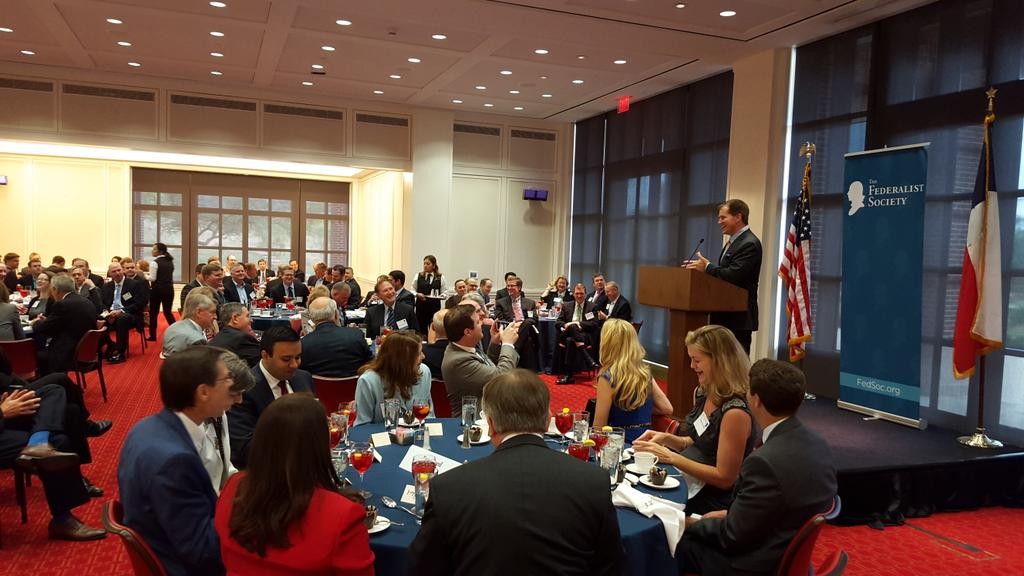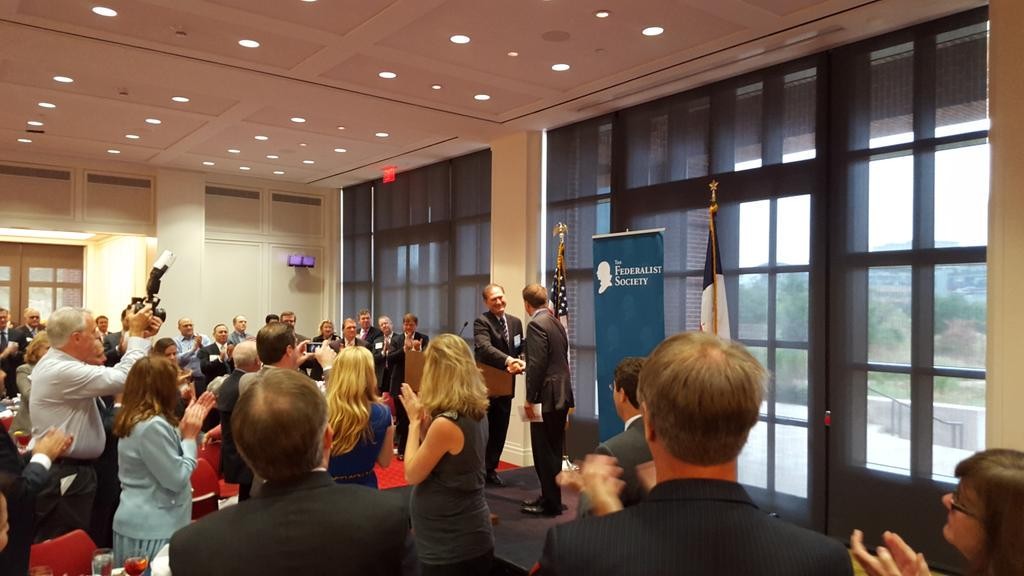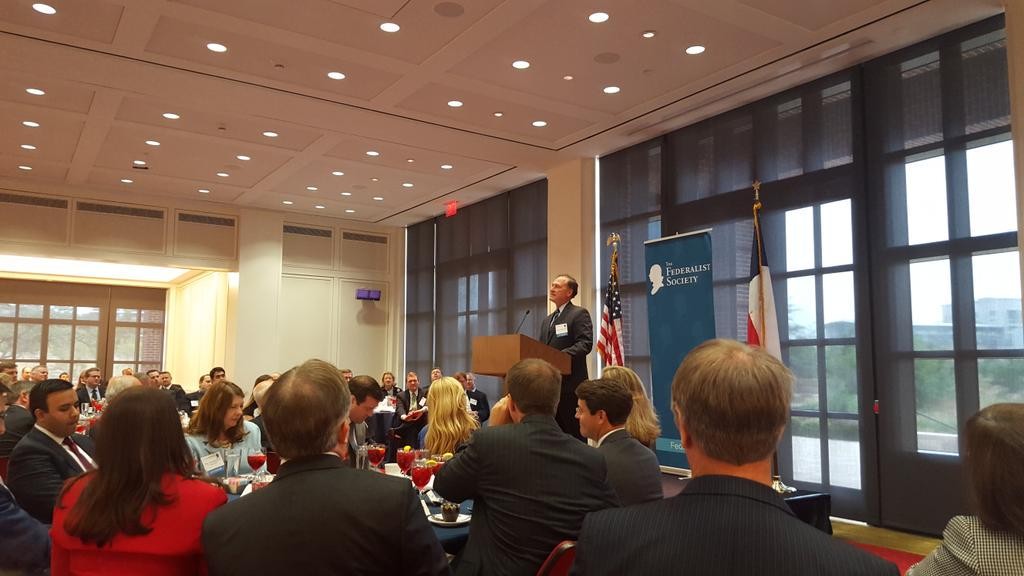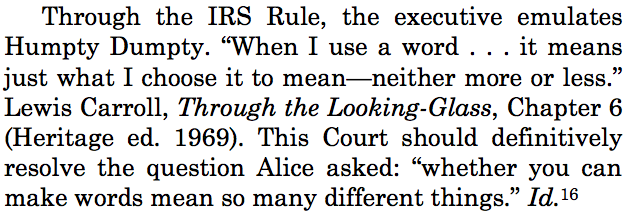During the Federalist Society’s Texas Chapters Conference, Justice Alito reflected on his decade on the Court. He spoke about Obergefell, King v. Burwell, Glossip v. Gross, the Arizona Redistricting Case, United States v. Johnson, United States v. Jones, Arizona v. United States, CLS v. Martinez, EEOC v. Hosannah-Tabor, Citizens United, Bob Jones, United States v. Alvarez, United States v. Stevens, Inclusive Housing, and Chevron. (All quotes are based on my rough attempt to transcribe the event–please email me any corrections if you have them.)
After the American and Texas pledges of allegiance by Judge Jennifer Walker Elrod, and a rousing introduction by Texas Supreme Court Justice Don Willett (you may just know him as @JusticeWillett), Justice Alito took the podium, in a “looking back mood.” Alito noted that October 31, 2015 will be the 10th anniversary of President Bush’s announcement of his nomination (quite fittingly on Halloween). January 31, 2016 will be the 10th anniversary of his confirmation.

After the announcement, he was driven to Capitol Hill to meet with Senate leadership. He met with Senator Arlen Specter, who was the chair of the judiciary committee. The topic that interested him the most was stare decisis. He had the idea that there was a “super precedent,” if it was reaffirmed on a number of occasions. Stare decisis was an importnat issue during his confirmation process. Alito explained, “As I’m sure all of the lawyers in the room know, it is a latin phrase. It means, to leave things decided when it suits our purposes.” Alito noted that the Court’s decisions list so many factors of when precedent should and should not be followed, that there is no hard and fast rule. He offered a great example: “Stare decisis is like wine. If it’s really new, you don’t want to drink it, it has to age for a while. If it’s really old, it is very valuable, or it has possibly turned to vinegar. There’s this magical period in between. It not difficult for a judge to make the stare decisis inquiry come out however the judge wants it come out.”

Alito noted two opinions this year that did not adhere to stare decisis. First, United States v. Johnson, “which overruled two holdings that were issued during my time on the Court.” Second, “even more dramatic was Justice Breyer’s dissent in Glossip v. Gross. Justice Breyer, joined by Justice Ginsburg” suggested that the “death penalty was under all circumstances unconstitutional. Despite the fact that the Constitution refers twice to the death penalty. There would be a pretty strong stare decisis case against the move he is recommending.”

Alito then turned back to his confirmation process, and recalled the “failure of a last-ditch attempt by then-Senator Kerry to filibuster the vote on my nomination. Sen. Kerry launched this effort to launch this effort from Davos, Switzerland.” Alito quipped that this may have been one reason why the effort failed. Alito added that One of Sen. Kerry’s chief reasons was that he was in favor of expanding executive power beyond it’s proper limits. {Raucous Laughter}. Other senators made the same point. Why did they think this?
Alito explained, “they pointed to a speech I had given at a Federalist conference in D.C. I said things that should not be controversial. We have only one President at a time, the Constitution gives that President the entirety of the executive power. I did not explain what it is included in the executive power. Had I addressed it, I would have said, the Constitution contemplates a President that is energetic in the exercise of those powers. Prominent among those powers, are powers over commander in chief, and powers to take care that the laws are faithfully executed.” Alito then moved onto recent developments in caselaw.
He began, “over the past 10 years, I have been struck by assertions of executive power that extend far beyond anything I had ever imagined. In Arizona v. US, the Solicitor General argued that a state law may be preempted not just by a statute enacted by Congress, or regulation properly issued by agency, but by Secretary of DHS’s priority, which can be informally changed without any time without prior notice. The argument was unprecedented, and not a single justice accepted it.” Next, Alito turned to UARG, and explained that SG Verrilli has “also argued that the doctrine of enforcement discretion allows the executive to change the text of the law without an act by congress. The court rejected this remarkable assertion of executive power to effectively amend a statute.”
Moving on from executive power, Alito turned to religious liberty. “Another thing that has changed in the last decade was the change in attitudes towards religious liberty.” After explaining the background of RFRA, Boerne v. Flores, and RLUIPA, he notes, “over the past ten years, something quite dramatic has happened. An inkling was provided in CLS v. Martinez, a 5-4 decision. Hastings Law School threw the Christian Legal Society off campus because the society’s beliefs that members should hold traditional Christian beliefs on a variety of subjects, including on sexual relations, and only people of the opposite sex should be allowed to marry. The Court allowed Hastings to get away with just that. It was an eye-opening decision. The claim of religious liberty could not stand up with an idea supported by influential segments of society.” Verrilli also cited the “remarkable argument” the Solicitor General made in EEOC v. Hosannah Tabor that there was no ministerial exception–this lost 9-0–and the government’s argument in Hobby Lobby.
Next, Alito turned to Obergefell when he asked the Solicitor General whether the “same consequence that happened in Bob Jones” with respect to denying tax-exempt status “take place here. Would IRS be in power to deny tax exemptions to a school that opposes SSM. His answer is as follows: ‘It is certainly going to be an issue I don’t deny that it is going to be an issue.’ Whether the tax exemption issue will come up, we don’t know, but what does seem certain, is that related issues will arise, and how those claims of religious liberty will fare in the atmosphere of today, versus the atmosphere when RFRA was enacted remains to be seen.”
Next, Alito turned to free speech–a topic he has addressed at some length. He began with Citizens United. “It has long been recognized that political speech lies at the core of the First Amendment. That has not been a controversial point. The most important point involving political speech, was a very controversial case, Citizens United. To this day, it is reviled in many quarters. It involves a movie about a candidate for the office of the President. One would think this was political speeh at the core of the first amendment. When we held by 5-4 vote that the provision of the Bipartisan Campaign Finance Reform Act (BCRA) that restricted right of a little corporation to show a movie in period preceding election violated the 1st amendment. That created a firestorm of controversy that continues to this day. A constitutional amendment to overturn that decision has more than 40 sponsors in the Senate.”
Next, Alito moves on to peripheral speech cases, which he does not view as strong (consider his votes in Snyder v. Phelps and United States v. Stevens). “While protection of core political speech is very controversial, the Supreme Court has gone very far, I think too far, in protecting peripheral speech, that is very far from core of the 1st amendment, that has little to do with the search for truth. I’m talking about Stevens, which involves prohibition of crush videos. Snyder v. Phelps, involved protests at funerals of service members who were killed, that launched bitter attack against deceased, inflicting great emotion harm on families. United States v. Alvarez, struck down stolen valor act, which prohibited false claim of having won military award. Something very strange has been going on. A shifting of the protection of the focus of the 1st amendment, what had been the core–political speech, and the search for truth, to the protection of speech for the sole purpose of self-expression. For example, Alvarez said people lie all the time, and it makes them feel good.
Alito moved onto privacy and the 4th Amendment. “Another change in the past decade has been constitutional protection for privacy. During the past ten years, the Court has applied the 4th amendment’s prohibition against unreasonable search and seizure to modern technology. I think this is going to be a very big issue moving forward. The 4th amendment was adopted with traditional property law in mind. What was once new technology (wiretap and eavesdropping), it was difficult to apply old property based standards to the new technology. The Court adopted a new test, and looked to reasonable expectation of privacy on the part of the individuals. That standard worked for a while, but with the development of new technology, it has become very difficult
The first case was “United States v. Jones, which involved placing a GPS tracking device on someone’s car. How do you apply the 4th amendment standard to that situation? What government has done is to take the precedents developed during the pre-digital error and apply them mechanically to the new issues. It has not worked in the Jones case. The Court decided the case on a ground I did not agree with. The Court looked back to common law trespass law–there was a trespass for law enforcement to place electronic device on a car. The placement of the device did not harm–that missed what was really the important issue. That missed the important issue which was the surveillance of the device on the car.
The “second case was Riley v. California–whether police can search the contents of cell phone. In the pre-digital era, police could search the person of someone who is arrested, and if that person has stack of letters, that could be searched. But what do you with a smartphone at the time of arrest. We held that content could not be taken without a warrant or probable cause.”
Alito closed with a call for Congress to address these issues, not the Court. “These are just some of the issues that may come up. The problem is that in making determinations we are put in a position of determining what is a reasonable expectation of privacy. We are very ill-positioned to make these determinations. We are older than the average person. This may come up as a surprise–We are not up on all the latest technology. If privacy is to be protected in the future, that balances the interests of law enforcement and the interest of privacy, legislatures should take the lead. They are in a better position that the courts.”
Next, Alito praised the move towards textualism. “A very positive development in my career has been a trend towards textualism in statutory interpretation. When I got out of law school, there was a tendency to think the words of a statute are what you look at if it he legislative history is not clear (slight exaggeration). There has been a salutary change away from that.”
But he lamented three cases last term that failed on textualism–Inclusive housing, the Arizona redistricting case, and (of course) King v. Burwell. “Last term on the court was a really bad one for textualism.” First, in Inclusive Housing, he accused the court of “torturing the english language” with respect to the words “because of.” Second, in the Arizona redistricting case, “the straightforward reading of the constitutional text did not prevail.” Finally, for King v. Burwell, Alito explained “the act provides that tax credits are given to individual covered by health insurance plans that was enrolled in through exchange “established by the state.” It appear that the drafters of the ACA assumed that most if not all of the states would establish exchanges, but most did not do so and therefore the federal gov stepped in and established exchanges in those states. The question was whether individual who purchased policies on these federally established exchanges are eligible for tax credits. Based on the plain language the answer seems pretty clear: an exchange established by the fed gov is not established by the state, but the court held otherwise. Last term was a term in which the court followed what Humpty Dumpty famously said: “When I use a word . . . i tmeans just what I choose it to mean–neither more nor less.’ It was a very bad term for textualism.
As an aside, the Cato briefI joined in King v. Burwell used just that reference:
Alito closed his prepared remarks by turning to “two things on unenumerated rights. In holding that there is a constitutional right to same sex marriage the court relied on one word in the Constitution, “liberty” in the Due Process Clause of the 14th Amendment. Liberty is a glorious concept, I’m sure everyone in this room, and I put myself in that room, prizes liberty. But it is also a term that means different things to different people. It means different thing to a libertarian and a social democrat. How then can court determine what is meant by the term liberty in the 14th amendment. Before Obergefell, the answer was provided by Washington v. Glucksberg, which involved the right to assisted suicide. The court held that due process protects those rights that are deeply rooted in the nation’s history. The right to same-sex marriage lacks such roots. The Obergefell majority did not claim otherwise. The majority was convinced this was fundamental right. In the future, is every judge entitled to read his personal understanding of the liberty into constitution. I suspect among the people here, there are a variety of views of same-sx marriage. That was not the issue before the court. Whatever anyone here thinks about same-sex marriage, I believe those people should be concerned about implication of the reasoning of Obergefell for future cases. The decision raises profound questions about constitutional interpretation.
Alito finished by recalling a comment from a colleague on the Third Cicuit–after a contentious case, he would say “Next case.” Alito said, “I hope things will turn out better for the new term.”
Alito took a few questions during Q&A.
First, someone asked if the Take Care Clause imposes a duty. One word answer: “Yes.”
Second, someone asked about the propriety of Justice Kennedy’s opinion in Davis v. Ayalla, reaching out to discuss the solitary confinement issue. Alito responded, “I don’t think it would be appropriate for me to list in an opinion issues I am interested in. But if an issue is related in the manner, that is, this case doesn’t involve this issue, but I would like to note there is this separate, related issue, then it is appropriate.
Third, he was asked a question about judicial supremacy. “All three branches are required to abide by the Constitution. All take the oath to be faithful to the Constitution. When Congress is enacting a statute, they have the responsibility to decide not just whether it is good policy but whether it constitutional. I there was a time when Congress was more in a habit to do so. There have been instances where we have been criticized by congress for upholding law that member has voted for. [JB: Both former Senators and Secretaries of State Clinton and Kerry voted in favor of the law at issue in Zivotofsky]. “They have a duty to adhere to the Constitution like we do. It was much more common for President in the 19th century to veto legislation on the ground that it was unconstitutional, not just on policy grounds.
“We are not alone in interpreting the constitution. Each branch can interpret the Constitution in a way that is not subject to review by the other branches. The President can veto a bill because he thinks it is unconstitutional, even if Supreme Court precedent says it is constitutional. Congress can decline to exercise the full measure of its authority under commerce precedents because they think the commerce clause does not extend as far as the courts have said it is to extend. There are instances of judgments of courts must be obeyed under the Constitution. That doesn’t mean that the rest of people have to shut up on that issue. It doesn’t mean people have to refrain from criticizing our decision. In the wake of the Obergefell decision, one article was written that those of us in dissent were being treasonous for being harsh of judgment of majority. That is not true at all. Not just because we have special privilege, but because citizens have no obligation to agree with any of our decisions, including decisions I write in. They can express their views robustly. They can use all of the legal procedures that are available under our law to try to challenge the scope of our decision. We are a nation of laws. It is important for people to respect the actions by the branches of government when they are acting within the proper scope of their authority.”
Fourth, a question was asked, in several admin law cases, based on some concurrences and statements in majority opinions last term, whether the Court is “indicating that there may be a trend towards evolving standards of review.”
Alito answered, “yes, there were several opinions in which members of the court had questioned, in particular, the rule that the courts should give great deference to administrative agencies concerning the interpretation of their own regulations. I do think that many of us are sensitive to the way in which the Chevron doctrine has been interpreted. We are interested in making sure there is not interpretation in a way that allows agencies to contravene statues. It would be helpful if congress did not enact laws with such standards so broad that it gives the agency essentially carte blanche to do whatever they want. The first case I heard oral argument after I joined the court was Rapanos, which involved the clean water act. The phrase Congress used is the “Waters of the United States.” This is not a term of art, there is no definition in the statute. There is nO way of knowing what is included. [He points to his glass of water and asks, is this water of the United States]. Is puddle in jurisdiction of United States? He asked only one question: “Does it make any sense to say that any wetlands that it abuts a traditionally navigable water is covered, but a tributary that leads right into a traditionally navigable water is not necessary covered?”
Fifth, he was asked about lifetime tenure. “I think it is a good thing. We are pretty much alone among supreme courts of the world in having appointments for life w/o mandatory retirement age.” But, he noted, “our Constitution was adopted in the 18th century when they were counting on biology to take care of the problem. With improvements in modern medicine, we are hanging on for long time.”
Sixth, Alito criticized “The enormous quantity of really silly stuff written by academics. A lot of what academics write is good, but some is unbelievably silly. One study looked at the way in which a lawyer said the word ‘may it please the court.’ What they concluded, if lawyers was forceful, lawyer was likely to lose. Handy tip to advocates, you should be very mousy.”
“The second study looked at the grumpiness of all the Justices. These academics pick up certain words that are grumpy words. Other words that are happy words. This is what they want to do now–county everything. Count the percentage of grumpy and happy words in opinions of all Justices. They discovered that grumpiest justice of all time is Justice Johnson. This poor justice wrote exactly one opinion. IF you look at his portrait, he has an angelic looking face. I have instructed my law clerks to find the list, and use no more grumpy words, only happy words, so I can rise in rankings.
